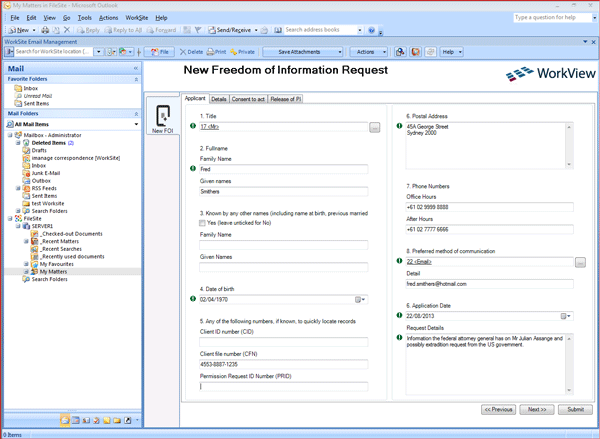An application to record/track and resolve FOI requests
Recently, our news media have been featuring prominent stories on the conflict between a democratically elected government wanting to protect certain information from its citizens, and the right to know or access to this material from the citizens. Witness the Assange/Snowden cases and the massive media and public interest this has generated.
All levels of government in Australia (and most overseas nations) provide a medium for people to request information on any topic, though the overhead/cost and time to service this request can be onerous for the agency involved.
Trinogy has developed a solution for organisations/entities that have to deliver FOI content, encompassing the recording/tracking of the request, monitoring time critical dates and the electronic searching for content that satisfies the request.
The first task, to record/track the FOI request, is provided by an application operating entirely within MS Outlook and lets a site customise the data entry form(s) and database to hold the FOI request data using an advanced technology invented by Trinogy to develop Outlook based applications.
The department can store any number of fields relating to the FOI request and the application uses standard MS Outlook contacts to hold personal information, while the FOI fields such as number, date, request, time recording, disbursements and so on are entered into the site defined form and optional tabs – there is no limit to the number of fields or types.

An example of a completed FOI request as it appears within MS Outlook.
Key dates are tracked, such as ‘response due’, or ‘place on hold until’ and optionally recorded in the user’s MS Outlook calendar to simplify follow-up of FOI dates/events.
Having recorded the request, the application invokes the HP/Autonomy IDOL search function to inspect and categorise all electronic content and return the results, which can then be printed/referenced via web portal/compressed or otherwise processed. The electronic content that is searched includes files stores, users local hard drives, MS Sharepoint, HP Records Manager (Trim), WorkSite, Documentum, SQL, and hundreds of other file types.
The traditionally difficult part of processing the FOI request was the searching of all possible content that satisfied the request, and then assembling this and providing it to the requestor.
To solve this we have deployed a specialised version of the HP/Autonomy IDOL search platform, which allows the application to conduct searching of all content in more than 400 repositories including SQL databases, all ECM systems such as HP Records Manager (aka Trim), Documentum, Objective, WorkSite, MS Sharepoint, users ‘C’ drives, file stores, intranets and so on.
The IDOL search returns any piece of content, email/document/record/web page/video or audio file, that meets the condition of the FOI request .
The result of the search can then be retained in the FOI application and made available via direct linking to an external facing Web portal, ‘zipped’ into a single file or transferred to a common file format, such as PDF, for delivery to the applicant.
Robert Fraser is a director with Trinogy Systems and an IT veteran with more than 35 years experience in mainly sales/marketing roles. Email: robert.fraser@trinogy.com.au
